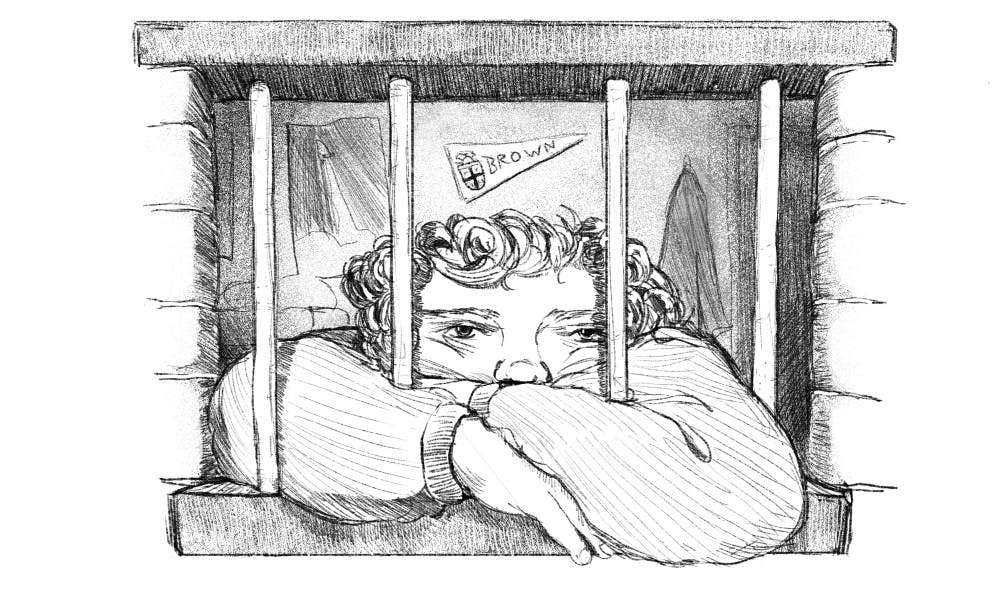In July 2020, Brown announced its three-term model for the 2020-2021 academic year. Sophomores, juniors and seniors were given the opportunity to be on campus for the fall 2020 semester, while first years were allowed to be on campus during the spring and summer 2021 terms. With the final semester of the three-term model currently in progress, first-years are now navigating a full workload of classes and the newfound constraints it puts on their job and internship opportunities.
Some first-year students hoped that being on campus during the summer would come with a greater sense of normalcy. But while some restrictions have been eased, many restrictions are still in place, such as those requiring mask-wearing indoors and “grab and go” dining options.
“On the one hand, there is an added social ability during the summer that would not have been there if we'd done a traditional fall/spring schedule,” Maddie Walters ’24 said. This summer is Walters’s second semester on campus, following the spring 2021 term.
Other first-year students also felt that the summer term added a social component to their first-year experience that they appreciated.
“The (three-term model) made me feel as if I would have a greater chance of making friends and attending class in-person,” Noah Stanton ’24 said.
At the same time, taking a full course load this summer has created difficulties for first-years looking to take part in traditional summer work opportunities or internships.
“Taking summer classes has made it almost impossible to work a usual summer job,” Alex Dufort ’24 said.
“I planned on looking for a job either this semester or next year, but I am still acclimating to having such a heavy reading (and) studying load,” Stanton said.
Some students cannot afford to give up summer work. “I think a lot of kids here want internships or work experience for resume building. For me, working over last summer and fall is how I paid for (freshman year). Now I won’t be able to pay for the next year’s semesters without working this summer,” Audrey Skehan ’24 said.
“I was fully planning on my summer job to help pay for my college, and, with taking classes, it simply is not feasible,” she added.
Although on-campus jobs are available, those that are in-person are hard to come by, Skehan said. The difficulty of finding an in-person job has made her “Brown experience unfulfilling thus far,” she said. “I applied for an (in-person), on-campus job, but never heard back.”
Even for those who have found on-campus work, the pay and amount of work hours available do not always measure up to at-home opportunities. Walters, who works in the Department of Earth, Environmental and Planetary Sciences, said that she “strongly considered studying at home in order to continue working at the local produce store. It pays very well, and I would have been able to make a significant dent in my loans.”
Walters felt that lowering tuition was the only solution to counteract the lost summer opportunities. “Since Brown did essentially mandate that we take summer classes, eliminating the ability for summer work, they should make it legitimately possible for students dependent on summer jobs to be able to pay their tuition,” she said.
In response to the announcement of the three-term model, CareerLAB is offering virtual programs during the summer of 2020 for all students, and specifically for first-years.
“We did get a lot of questions from students about how to navigate the summer (and) how to deal with the fact that (they) are going to be enrolled in classes … and there wouldn’t necessarily be the opportunity to do summer work,” Matthew Donato, CareerLAB’s director, said.
Summer workshops give students the ability to connect with alums and learn more about what CareerLAB has to offer. A session at the end of July 2020 addressed first years specifically and “tried to put the idea of summer internships and summer work experiences in context, to take the stress off first-year students,” Donato said.
CareerLAB wants first-year students to focus on self-assessment, so that they can have an opportunity to think about what work opportunities to pursue in the future, Donato said. “There can be a lot of people in BrownConnect who you (can have) a really helpful conversation with … and (who can) give you insight and information,” he added.
Networking is something first-year students can begin doing throughout this summer and will continue doing during their time at Brown, Donato explained. “Networking is an essential skill we want students to have.”
Donato emphasized that “it’s okay not to have an internship during the summer of your first year, even (in) a normal year.” First years who do not have an internship or employment this summer are not lagging behind their peers, he said.
While CareerLAB has offered many programs specifically catered to first-year students, including virtual workshops called “Getting Started with CareerLAB for First-Year Students” and “Awesome Resume Writing for First Year Students,” attendance has been fairly low, according to Donato.
“Attendance wasn’t great, but I think the students who participated really got a lot out of the ability to connect with alumni around a lot of different topics, (such as) how to explore your career options,” Donato said.
Despite Donato’s efforts, some first years felt unsure of how to use CareerLAB.
“I haven't used CareerLAB. I barely know how to use it or what resources it offers,” Dufort said.
Skehan and Stanton both had similar thoughts about CareerLAB, having never used it and not considering it as a resource when looking for summer work opportunities.

ADVERTISEMENT




